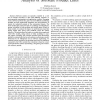Free Online Productivity Tools
i2Speak
i2Symbol
i2OCR
iTex2Img
iWeb2Print
iWeb2Shot
i2Type
iPdf2Split
iPdf2Merge
i2Bopomofo
i2Arabic
i2Style
i2Image
i2PDF
iLatex2Rtf
Sci2ools
MODELS
2015
Springer
2015
Springer
Multi-Perspective Modeling and Performance Analysis of Software Product Lines
—Software system are typically available in a rich set of variants nowadays to deal with differing customer or environmental requirements and application contexts. Managing such a software product line, gets even more difficult considering multiple involved engineering disciplines and long lifetimes, as typical for industrial systems of the automation domain. The thesis tackles this system diversity by modeling interdisciplinary system variability in both problem and solution space. Based on these models, we analyze the impact on performance properties during design time giving early feedback about the system behavior. The solution space is based on a model-driven approach with UML models, using notions of delta modeling to manage system variability and evolution enriched with information needed to automatically derive and analyze a performance model. Motivated by its widespread use in software engineering, we consider feature models for the problem space that are ultimately connect...
Related Content
| Added | 15 Apr 2016 |
| Updated | 15 Apr 2016 |
| Type | Journal |
| Year | 2015 |
| Where | MODELS |
| Authors | Matthias Kowal |
Comments (0)

